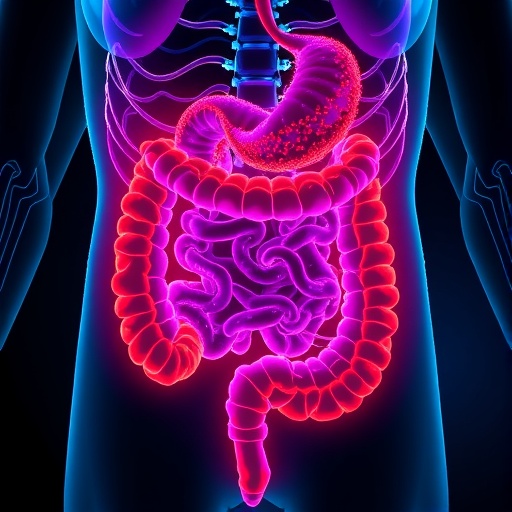In a groundbreaking study poised to reshape prognostic strategies in colorectal cancer (CRC), researchers have uncovered the intricate interplay between cyclooxygenase-2 (COX-2), stromal programmed cell death ligand 1 (PD-L1), and T-cell infiltration, establishing a novel immune-inflammatory axis that enhances the precision of patient risk stratification. This discovery emerges from an extensive analysis integrating immunohistochemistry (IHC) profiling and transcriptomic data, unveiling complex tumor-immune microenvironment dynamics that dictate clinical outcomes.
Colorectal cancer remains one of the leading causes of cancer-related mortality worldwide, with prognosis heavily influenced by the tumor immune microenvironment. While existing staging systems, such as TNM classification, provide useful clinical frameworks, they often fail to capture the heterogeneity of immune interactions within the tumor milieu. Prior investigations have implicated inflammatory mediators like COX-2 and immune checkpoint molecules such as PD-L1 in modulating antitumor immunity and therapeutic responses; however, their combined prognostic value alongside T-cell infiltration has lacked clarity until now.
This study deployed a dual-pronged approach that combined an internally curated cohort of 320 CRC patients with comprehensive public genomic datasets, including GSE39582, TCGA-COAD, and E-MTAB-12862, allowing robust cross-validation of findings. Using advanced bioinformatics tools such as CIBERSORTx and single-sample gene set enrichment analysis (ssGSEA), the investigators meticulously characterized immune cell subsets and molecular signatures, stratifying tumors via consensus molecular subtypes (CMS) to contextualize immunobiological variations.
One of the pivotal revelations was that PD-L1 expression localized within the tumor stroma, rather than cancer cells per se, wielded superior prognostic influence. Stromal PD-L1 correlated strongly with elevated COX-2 levels and increased tumor-infiltrating lymphocytes (TILs), underscoring a cooperative immunoregulatory network that shapes tumor behavior. These associations were consistently observed across cohorts and mirrored by transcriptomic expression profiles of CD274 (encoding PD-L1), PTGS2 (encoding COX-2), and CD8A, which notably co-enriched in CMS1 subtype tumors known for their inflamed microenvironment.
Intriguingly, tumors with heightened PTGS2 expression exhibited an inflammatory yet paradoxically immunosuppressive microenvironment, characterized by activation of interferon gamma (IFN-γ) signaling and inflammatory response pathways. This dichotomy highlights the complex dual roles of COX-2-driven prostaglandin pathways in both fostering immune activation and promoting tolerance, a phenomenon that has significant therapeutic implications.
Survival analyses incorporating multivariate models demonstrated that integrating stromal PD-L1, COX-2, and T-cell markers into a unified immune-inflammation risk score markedly outperformed prognostication based on single markers. This composite risk signature improved predictive accuracy beyond standard TNM staging, offering a refined tool for clinical decision-making. The findings suggest that tumor immune contexture and inflammatory mediators must be evaluated in tandem to capture the nuanced biology driving colorectal cancer progression.
The mechanistic underpinnings likely involve COX-2-mediated prostaglandin synthesis fostering an immunomodulatory niche that influences PD-L1 expression on stromal cells, thereby regulating T-cell infiltration and activity. This triad constitutes a conserved immunoregulatory axis that modulates tumor-immune interactions, potentially dictating responses to immunotherapy and chemoprevention strategies. Given the advent of checkpoint inhibitors and their variable efficacy in CRC, these insights pave the way for biomarker-driven patient stratification and combinatorial therapeutic approaches.
Moreover, the enrichment of these markers within CMS1 tumors, a molecular subtype characterized by microsatellite instability and high immune infiltration, further corroborates the clinical relevance of this axis. Targeting COX-2 signaling in conjunction with PD-L1 blockade may synergistically enhance antitumor immunity, an approach warranting rigorous clinical evaluation.
This expansive research effort underscores the transformative potential of integrating immunohistochemical and transcriptomic data to decode the tumor microenvironment’s complexity. By moving beyond isolated markers to composite risk models incorporating immune checkpoints and inflammatory enzymes alongside immune cell infiltration, the study sets a new benchmark for prognostication in colorectal cancer.
Importantly, the development of an IHC-based immune-inflammation risk score facilitates translation into routine pathology workflows, ensuring accessibility and applicability in diverse clinical settings. This practical tool promises to guide personalized treatment strategies, optimizing outcomes while sparing unnecessary toxicity.
Looking ahead, these findings may inform novel clinical trials combining COX-2 inhibitors, immune checkpoint inhibitors, and T-cell modulating agents, aiming to overcome resistance mechanisms and enhance durable responses. They also suggest avenues for chemopreventive interventions targeting the COX-2/PD-L1 axis in high-risk patient populations.
In sum, this comprehensive study reveals that stromal PD-L1 and COX-2 create an immuno-inflammatory landscape that intricately governs T-cell infiltration and tumor progression in colorectal cancer. Their combined evaluation refines prognostic stratification, heralding a new era of immune-informed oncology that integrates molecular, cellular, and spatial tumor parameters.
As the oncology community increasingly embraces precision medicine, such integrative biomarkers will be key in tailoring therapies and monitoring disease trajectory. This research not only advances scientific understanding but also holds profound implications for improving patient care and outcomes in colorectal cancer.
The study, recently published in BMC Cancer, represents a significant leap forward in elucidating the complex tumor-immune dialogue and sets the stage for translational advances that leverage immune modulation as a cornerstone of effective cancer management.
Subject of Research: Integration of cyclooxygenase-2 (COX-2), stromal programmed cell death ligand 1 (PD-L1), and tumor-infiltrating lymphocytes (TILs) to enhance prognostic stratification in colorectal cancer by analyzing tumor immune microenvironment heterogeneity and developing a composite immune-inflammation risk score.
Article Title: Integrating COX-2, stromal PD-L1, and T-cell infiltration enhances prognostic stratification in colorectal cancer
Article References:
Topi, G., Sjölander, A. & Satapathy, S.R. Integrating COX-2, stromal PD-L1, and T-cell infiltration enhances prognostic stratification in colorectal cancer.
BMC Cancer 25, 1424 (2025). https://doi.org/10.1186/s12885-025-14927-x
Image Credits: Scienmag.com
DOI: https://doi.org/10.1186/s12885-025-14927-x
Tags: bioinformatics tools in cancer researchcancer risk stratification methodscolorectal cancer prognosis improvementCOX-2 and PD-L1 interactiondual-pronged research approach in CRCgenomic datasets in colorectal cancerimmune checkpoint molecules and therapyimmunohistochemistry profiling in oncologyinflammatory mediators and cancerprecision medicine in colorectal cancer treatmentT-cell infiltration in tumorstumor immune microenvironment dynamics





